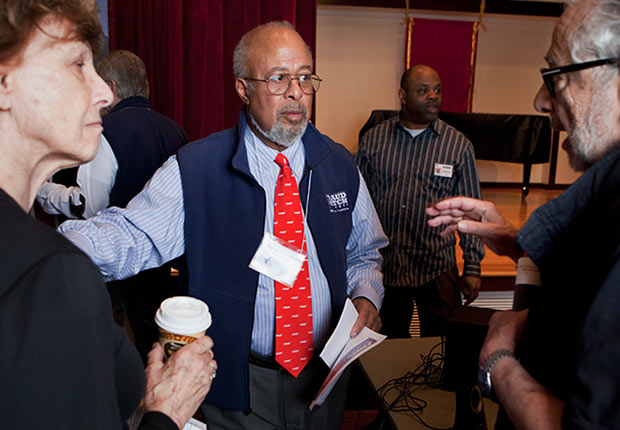AARP Hearing Center

Last December, three older Redding residents were scammed out of about $190,000 in separate incidents. All fell prey to the widely used “grandparents scam,” in which the victim receives a phone call from someone pretending to be a loved one who needs money to get out of jail or for some other urgent reason.
“This is just one of many scams circulating [in] the state, targeting seniors,” said Byron Peterson, a member of the AARP Connecticut executive council and lead volunteer for the organization’s Fraud Watch Network.
Other favorite schemes involve bogus jury duty and IRS problems, in which a person claiming to be an official calls a potential victim, threatening jail time for a fictionalized infraction if he or she doesn’t pay a penalty.
Then there’s the fake “electrician” or “city inspector” who shows up at a victim’s house, claiming he must have access to fix something or else the home will be flooded or go up in flames. Once inside the house, he can easily loot the premises.
One recent scam involves the supposed tech-support person who tries to get your credit card number by claiming that your computer has a virus.
Most people think, “I’d never be that dumb; I’d never fall for that,” said Peterson, 70, of Shelton, who admits he’s almost fallen victim to various frauds.
But unless you’ve been on the other end of a phone with a sobbing “grandchild” or a threatening “IRS officer,” you don’t know how good at manipulation these scammers are, he said.
Connecticut ranked 19th in the nation for reports of fraud and for identity theft for 2013, according to a Federal Trade Commission report.
Last summer, AARP Connecticut launched Fraud Watch Network, a free program to educate older people and their families on how to protect themselves from con artists’ schemes. Fifteen AARP volunteers are available to make Fraud Watch presentations at places such as community centers.
Often they will be accompanied by experts from the state Department of Consumer Protection, the Better Business Bureau or the Connecticut Police Chiefs Association.
To request a presentation, contact Erica Michalowski, AARP Connecticut associate state director, at emichalowski@aarp.org or 860-548-3163.
Online resources available
Free online resources from the AARP Fraud Watch Network are at aarp.org/fraudwatchnetwork. Visitors can:
- Download The Con Artist’s Playbook and the AARP Watchdog Alert Handbook.
- Report and track scams.
- Sign up to receive occasional email scam alerts.
- Receive information on how to protect themselves and their family.
- Check the legitimacy of charities.
- Get help if they think that they have been the victim of a scam.
Scammers tend to target older people because they usually have nest eggs, grew up in a more trusting age, and tend not to report the crimes because they are embarrassed or afraid their families will restrict their independence, said Fairfield Police Chief Gary MacNamara, community outreach chairman for the Connecticut Police Chiefs Association.
Because fraud crimes are hard to prosecute—many of the perpetrators are overseas—the effort to fight fraud focuses on prevention. “Once we educate people about one scam, the perpetrators just come up with another. They are only limited by their imaginations,” MacNamara said. “I want to teach people to … stop, think, delay and discuss with someone else. Reach out—check with the police before you do anything else.”
The Fraud Watch Network helps people get into the minds of scammers and understand their techniques, so they will know what to look for, even if the ploy is a new one. It also gives people scripts to use when being pressured by a con artist.
So far, the network has held 100 events statewide and has been mentioned in three dozen radio, print and television stories, reaching more than 1.5 million people, Peterson said.
“People say we’ve given them the courage to stand up for themselves. And that is our main goal,” he said.Beth Levine is a writer living in Stamford, Conn.































































